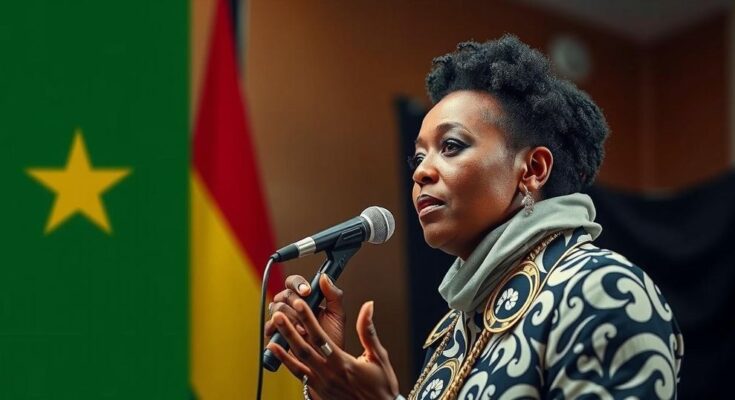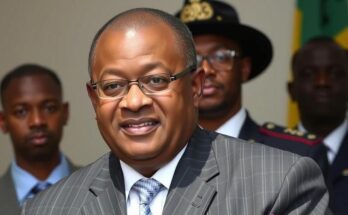Netumbo Nandi-Ndaitwah has become Namibia’s first female president with 57% of the vote, despite disputed election circumstances. The ruling Swapo party maintains power, but opposition objections highlight significant electoral issues. Nandi-Ndaitwah, a respected diplomat, faces a political landscape marked by potential challenges stemming from public dissent.
Namibia has marked a historic moment by electing its first female president, Netumbo Nandi-Ndaitwah, amidst disputed electoral circumstances. Announced as the winner of the recent presidential election with 57% of the vote, Nandi-Ndaitwah, who previously served as vice-president, defied expectations of a potential runoff election. Her victory consolidates the ruling Swapo party’s control, maintaining its grip on power since the country gained independence from apartheid South Africa in 1990.
Following the result announcement, Nandi-Ndaitwah emphasized the nation’s choice for stability, stating, “The Namibian nation has voted for peace and stability.” Having a background as a member of the underground independence movement, she rose to the vice-presidency earlier this year after the passing of President Hage Geingob.
However, the election was marred by technical issues, such as shortages of ballot papers, leading to an extended voting period, which opposition parties labeled as illegal. They plan to challenge the election results in court, as opposition candidate Panduleni Itula garnered 25.5% of the vote, a decrease from his 2019 performance. Despite being seen as a seasoned diplomat untainted by corruption scandals affecting some Swapo members, Nandi-Ndaitwah’s success represents a broader trend, contrasting with opposition losses in other southern African nations.
This outcome highlights a resilience in Namibia’s political atmosphere, as Nandi-Ndaitwah’s administration could face significant scrutiny and challenges ahead.
The backdrop to Nandi-Ndaitwah’s election revolves around Namibia’s political landscape, marked by Swapo’s long-standing dominance since independence in 1990. Though Swapo has been a stabilizing force, recent trends in southern Africa revealed a generational shift in voter sentiment against established liberation movements. This electoral outcome arrives amidst significant tension with opposition parties, reflecting broader disputes regarding electoral integrity and governance in the region.
In summary, Namibia has elected its first female president in a significant but contested election. While Netumbo Nandi-Ndaitwah’s victory promises continuity for the ruling Swapo party, the legitimacy of the election results remains the subject of opposition scrutiny. The political developments in Namibia may provide insights into the future challenges the new administration will face amid shifting voter sentiments in southern Africa.
Original Source: www.theguardian.com




